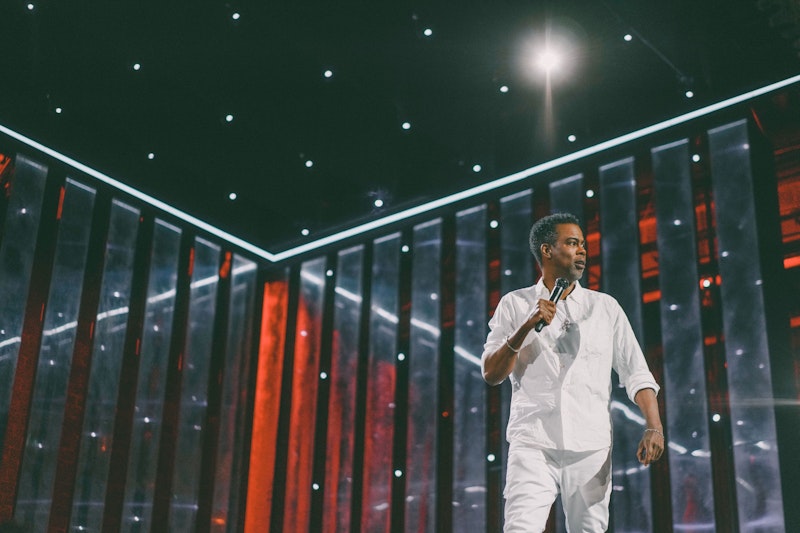Chris Rock is one of the greatest comics alive. This is by no means a controversial statement, it’s just true. Even those who don’t find Rock funny still can’t deny the incredible physicality and stage presence he brings to his act, the way he can command audiences of thousands with his strident delivery and clipped cuss words (no one says “fuck” and its derivatives better). There are comics I find funnier (Katt Williams, Todd Barry, and Maria Bamford, to name just a few), but there might not be a more energetic or lively performer in the world of stand-up comedy than Rock.
Rock is also a middle-aged rich guy. Again, not a controversial statement, just a fact. He admits as much in his latest special, Selective Outrage, which aired live from Baltimore last Saturday. “I’m rich, but I identify as broke,” he says, a rare Rock line that feels completely stale, the kind of well-worn material that would elicit groans at even the shittiest open mics. Then he says his pronoun is “broke,” an even more embarrassing line. This points to the biggest problem with Selective Outrage: it’s one of the greatest living comics recycling tired dad jokes. Not the punny, innocuous brand of dad joke (which sucks in a wholly separate way) but the “why won’t you let me see my grandkids?” kind, clearly designed to trigger the easily outraged yet too lame to offend anyone. Speaking of lame: “We used to want love, now we want likes,” he says at one point, the sort of earnest meme wisdom that, with a few grammatical errors and arbitrary quotation marks, would make for a good Dril tweet.
On the other hand, Rock is more easy-going about shifting social mores than a lot of his contemporaries, who practically foam at the mouth at any mention of pronouns, safe spaces, or trigger warnings. Rock seems less angry and more amused by the selective outrage he observes. The titular theme ends up being the throughline for the special, which successfully threads bits about victimhood (“Right now we live in a world where the emergency room is filled up with motherfuckers with paper cuts”), the double standards of cancel culture (“I play ‘Wanna Be Startin Somethin,’ it’s a party; play ‘Bump and Grind,’ now you an activist”), our addiction to attention (Rock’s four paths to getting attention: being infamous, being excellent, being a victim, or showing your ass), the capitol riots (“What kind of white Planet of the Apes shit was that?”), and of course, the Oscars slap.
That last one is clearly the selling point of the special. What does he think about what happened? Rock teases the audience with little references here and there—the first punchline goes, “Anybody who says words hurt has never been punched in the face”—but wisely waits until the end to address the time Will Smith slapped him on live TV. And like Smith, he doesn’t hold back, going in on the very public “entanglements” that may or may not be the origin of the Fresh Prince’s insecurity. Like a preacher in the pulpit, he reels the audience in with repetition, cataloging all the people who ridiculed Smith in the aftermath of his wife’s affair, a rapid-fire who’s who of black celebrities and commentators who “called him a bitch,” repeating those words about a dozen times before capping it off with a KO punchline: “And who's he hit? Me. A n***a he knows he can beat. That is some bitch ass shit."
The boxing analogy feels apt. Rock glides back and forth across the stage, bobbing and weaving with the speed and precision of Pacquiao (whom he compares himself to at one point). In a special that finds the comedian frequently against the ropes, it’s a welcome rebound, the kind of high-energy crescendo that’s rare in comedy specials today. This is Rock in top form, finally talking about something he truly cares about, something that has clearly been on his mind for the past year.
And why wouldn’t it be? (“It still hurts! I’ve got ‘Summertime’ ringing in my ears!”) The incident put him at the center of a global news story that sharply divided the public in its reactions, a position he obviously never wanted to be in and probably still gets asked about every day. From a quick search of Twitter, plenty of (very online) people feel that Rock’s joke went too far and Smith taking him to task was somehow chivalrous. It’s unclear what his critics expect from the man who once joked about O.J. Simpson, “I’m not saying he should have killed her… but I understand!” But I suspect these outsized reactions might be just another example of selective outrage, more or less validating Rock’s central thesis.
The special ends with the question Rock gets everywhere he goes: why didn’t he fight back? “Because I have parents,” he answers. “And you know what my parents taught me? Don’t fight in front of white people.” It’s a good closing punchline, an ironic jab at respectability politics. But irony has a way of getting lost in soundbites, headlines, and screenshots. Predictably, many of his critics think he’s being earnest, which points to an increasing problem comedians face with audiences: people don’t know what the jokes are. (Ranaan Hershberg has an excellent bit about Zoomers replying to his stand-up TikToks with, “Are you serious?”)
That’s the generous interpretation. The other possibility is that Rock’s critics know he’s being ironic and they’re willfully obtuse, intentionally misinterpreting the joke in a bad faith bid to generate more outrage. I get the strong sense that people who spend their time complaining about comedy online—both about it being too offensive and about how it’s under attack by wokeness—think they’re being righteous, fighting the good fight, and if they’re getting attention, it’s for being excellent. But in the end, they’re just showing their asses.

